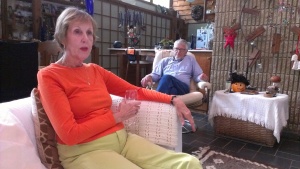(VIDEO) The cornbread conundrum: A scientist ponders the universe and his legacy
Earl Meeks waits for someone to listen.
His voice isn’t strong.
Earl, 81, a quiet former Georgia Tech senior research scientist, developed a theory about the creation of universe that challenges pretty much everything we think we know about it. For example, Earl’s theory contends that the Big Bang, the widely accepted theory about the creation of the universe, didn’t happen.
If his theories are true, Earl said it would mean that scientists and researchers have wasted billions searching for evidence supporting conventional theories, like the Higgs boson particle – a thing so small that physicists were at first unsure whether they’d found it or not.
Earl’s theories are a quiet voice of defiance in a field that searches for certainty.
“If you have a written recipe for cornbread, you shouldn’t be surprised at all that you end up with cornbread,” Earl said. “If you use a model of mathematics that requires the existence of bosons, if you do an experiment you shouldn’t be surprised that you find bosons. That’s not the same thing as proving they exist.”
In this video, Earl Meeks elaborates on his theories about the origins of the universe.
[youtube=http://www.youtube.com/watch?v=Qs_qcoam8d4&w=480&h=270]
I met Earl through my volunteer work with the re:loom project. Earl taught himself to fix weaving looms used by the homeless men and women who work in re:loom’s weave house as part of a job training program. Lisa Wise, the executive director of re:loom’s parent organization, the Initiative for Affordable Housing, told me that Earl would make for a good story.
I sat across from Earl in sparse conference room at the IAH office. Whenever I asked him a question he would take long, introspective pauses before answering.
Earl has written up a paper about his theory, but cannot get it published. Scientific journals have rejected his submissions, saying “It’s not up to their standards.”
“But there are no standards for original thinking,” Earl said.
Earl said he understands why people are reluctant to listen to his ideas, though. (He pronounces it like, “Idears.”) He tries to look at it from the publisher’s perspective.
“I sympathize with them,” he told me. “An 81 year old is not supposed to have any good idears.”
His home in Lilburn, Ga., is homage to his constant tinkering. He sculpts. He showed me a piece he carved out of wood from a cherry tree. He calls it Cherry Godmother. He gardens. He shows off his energy efficient home, with no central heat and a roof designed to capture sunlight. He keeps goats for mowing the yard, which is decorated with empty upturned Riesling bottles, their blue glass glowing the way ocean water does in travel brochures.

Earl Meeks gives a tour of his energy efficient Lilburn home. The upturned Riesling bottles are the trademark of his wife, Burrelle. Photo by: Dan Whisenhunt
The Riesling is the calling card of Earl’s wife, Burrelle. When I called her because I was running late to her interview she said, “Oh, that’s all right. Just drive safe. And just so you know, 6 p.m. is when I get the Riesling out.”
I liked her instantly.
Burrelle brightens a room with her voice, and described herself to me as someone who “can talk for 30 minutes to a wrong number.” She speaks like refined Southern aristocracy. Like Earl, she holds a PhD. She likes to learn. She’s recently taught herself to play the harp.
“I can hold my own, can’t I Earl? I’ll never be professional, ever,” Burrelle said. “I didn’t aspire to be I just wanted to be able to play it and now I can. I tell people I was afraid I wouldn’t get to heaven to play a harp as an angel. I would have to play it here.”
Burrelle tells Earle’s story better than he can. Within five minutes, I had learned more about him than I had in two hours of one-on-one interviews.
He’s from Savannah and has a twin sister. He didn’t speak until he was four years old, Burrelle said. (I remembered reading that famed physicist Albert Einstein didn’t speak until he was three.)

Opposites really do attract. Burrelle and Earl have been married for 56 years. They’re both highly educated, but Earl lets Burrelle do all of the talking. Photo by: Dan Whisenhunt
Seeing Burrelle and Earl together, I inevitably wondered how such completely different people could’ve met at all. They’ve been married for 56 years. They met at Florida State University.
“I was hostess at the Sigma Nu rush parties and doing my thing as a southern belle,” Burrelle said. “I just loved it and (that’s how) I met Earl.”
At this point I learned that Earl had enlisted in the Army and was at FSU on the G.I. Bill, another omitted detail. He said he did it because he thought he’d inevitably be drafted to fight in the Korean War, but shortly after he joined up the war ended.
Burrelle said she was smitten with the shy G.I. from Savannah.
“He was older and mature and I was young and ditzy,” she said. “He asked me to go to a football game.”
Soon they were married and they lived in Florida for a time. Earl said he eventually obtained a scholarship from NASA to study physics, and he obtained his PhD in physics from the University of Mississippi. He followed his former boss in Florida to Georgia Tech and that’s where he remained until he retired in 1992.
Burrelle recalls that Earl once told her if he were going to win a Nobel Prize in physics, he would’ve done it by the time he was 26. She said Earl mostly kept to himself during his years at Tech.
“He didn’t network when he worked either,” Burrelle said. “When he was at Tech he was in a lab by himself all day long.”
She told me she’s listened to her husband’s evolving theories of the universe for more than 20 years now. But does she believe them?
“I trust him, would be what I would tell you, and he is convinced that he’s right,” Burrelle said. “I don’t know enough to say it’s not right. Who knows? It’s kind of like talking about going to heaven. Who knows if it’s there or not? You have to believe or have faith. I’m just sad it came so late in his life because no one wants to listen to an 81 year old man.”
Earl remains hopeful. He agreed to the interview with me because he hoped it would spark an interest in his still unpublished theory.
Earl believes that time doesn’t actually exist.
“Time is our interpretation of a change,” he said.
I asked Earl if he could give me a point-by-point breakdown of how his theory differs from convention. This is what he sent me:
E = Earl S = Conventional science
S- The universe originates in a big bang that is the beginning of time, space, substance and motion.
E- Starting with the dictionary definition that the universe is everything that exists, intuition leads to the conclusion that the substance of the universe is permanent because nothing can be added or subtracted.
E- The motion of substance, that is easily observed, derives from a long fizz of a multitude of annihilations of mass, like positronium annihilation, that is confirmed by science.
S- The Heisenberg uncertainty principle has been interpreted to mean there is uncertainty in the substance of the universe.
E- If the substance of the universe is permanent (constant in existence), it cannot be uncertain. The uncertainty is in our understanding of its changing state.
S + E- The understanding of how to build our cities, transportation, agriculture and the Large Hadron Collider has been interpreted to be understanding of how the universe works. However, these actions are how observers work in the universe. The universe works from order to disorder. The life and actions of observers are from disorder to order.
Editor’s note: An earlier version of this article misidentified Meeks’ role at Georgia Tech. He was a research scientist.

